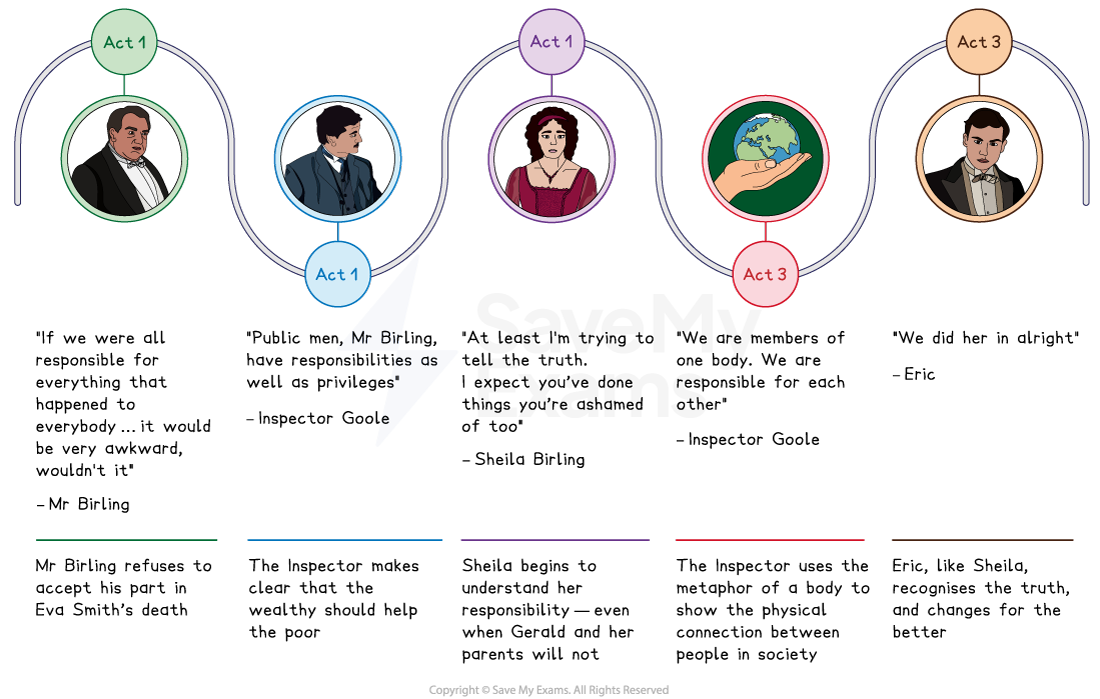An Inspector Calls Key Theme: Responsibility and Guilt (Edexcel GCSE English Literature) : Revision Note
Guilt and responsibility timeline
The themes of guilt and responsibility in each act of An Inspector Calls:

What are the elements of guilt and responsibility in An Inspector Calls?
Priestley presents the theme of guilt and responsibility in different ways through the characters. The telephone call that concludes the play is symbolic; there will be consequences for those who refuse to accept responsibility for their actions.
The Inspector: He embodies social responsibility, holding each character to account for their role in the “chain of events” that led to Eva Smith’s death
Mr and Mrs Birling: Representing a selfish older generation, they occupy an important position in society, but fail in their duty of care towards others
Sheila and Eric: Through their guilt for their behaviour towards Eva, these characters represent the potential for a more progressive younger generation to show greater collective responsibility
The impact of guilt and responsibility on characters
The play’s message of responsibility contributes to its dramatic tension and structure. The Inspector systematically questions each member of the Birling family, revealing their guilt and demonstrating how their actions all contributed to Eva Smith’s death.

Character | Impact |
|---|---|
The Inspector |
|
Mr and Mrs Birling |
|
Gerald |
|
Sheila |
|
Eric |
|
Why does Priestley use the theme of guilt and responsibility in his play?
1. Setting and period
Priestley underscores how the wealthiest in society enjoy privileges and lives of excess, while refusing to show compassion for the poorest and most vulnerable
Demonstrates the consequences of selfishness and ignorance (such as the disaster aboard the Titanic and the labour disputes)
2. Plot driver
The plot is structured around the Inspector’s interrogations of the Birling family, revealing their guilt and responsibility one by one
Reveals the “chain of events” that connect individuals and the importance of personal and collective responsibility
3. Audience appeal
Sheila and Eric come to represent Priestley’s 1945 audience — a more progressive and responsible generation
Mr and Mrs Birling, and Gerald, reflect the blinkered attitudes of an older generation whose irresponsibility would have unsettled Priestley’s audience
4. Dramatic device
Creates dramatic irony: the audience realise, before the Birlings do, that each will be interrogated by the Inspector, and therefore each bears some guilt
Leads to dramatic tension, such as the cliffhangers that end each act
Exam-style questions on the theme of guilt and responsibility
Try planning a response to the following essay questions as part of your revision of guilt and responsibility:
Explore how Priestley presents the attitudes of Arthur and Sybil Birling towards their role in the death of Eva Smith.
How does Priestley show that the effects of guilt and responsibility change the character of Sheila in An Inspector Calls?

You've read 0 of your 5 free revision notes this week
Sign up now. It’s free!
Did this page help you?

